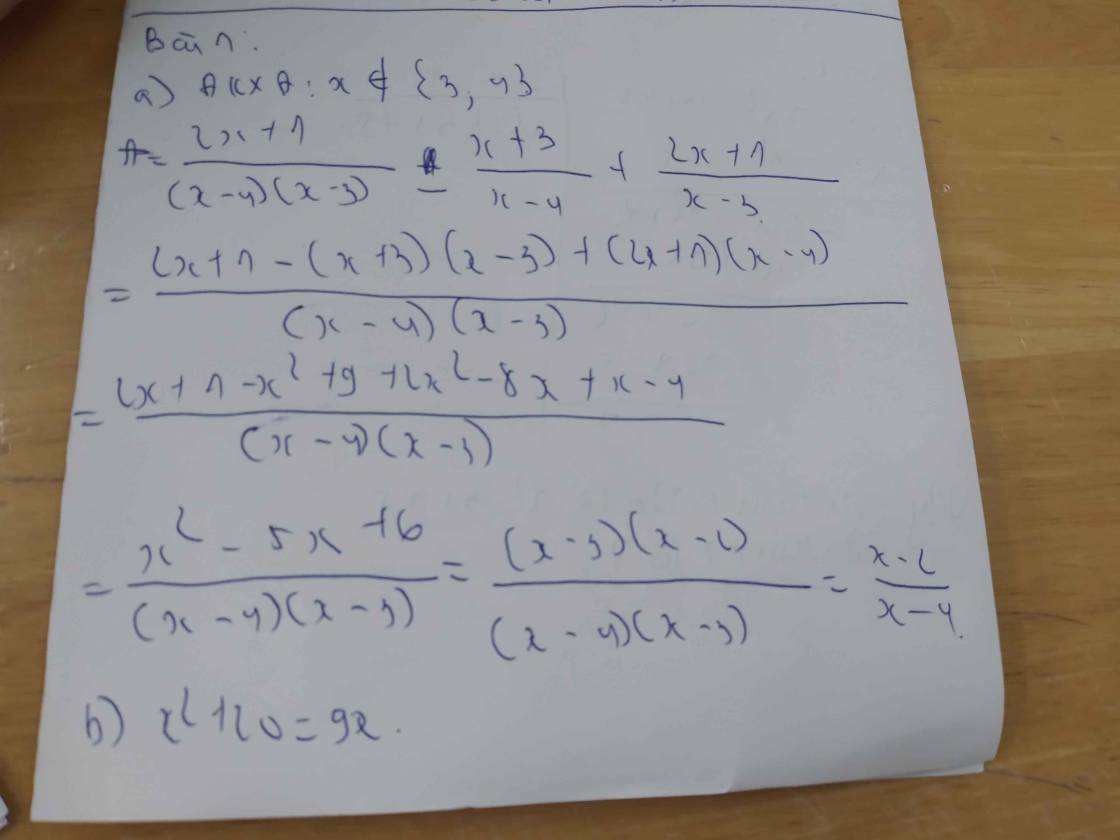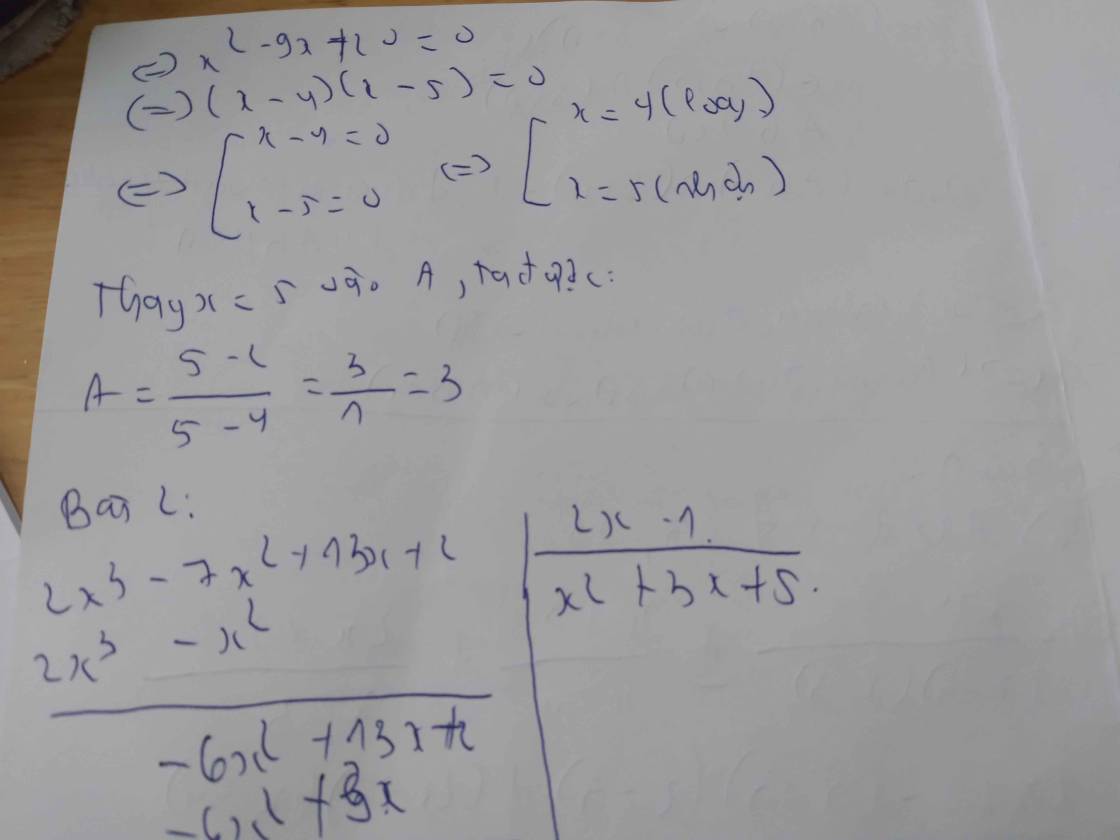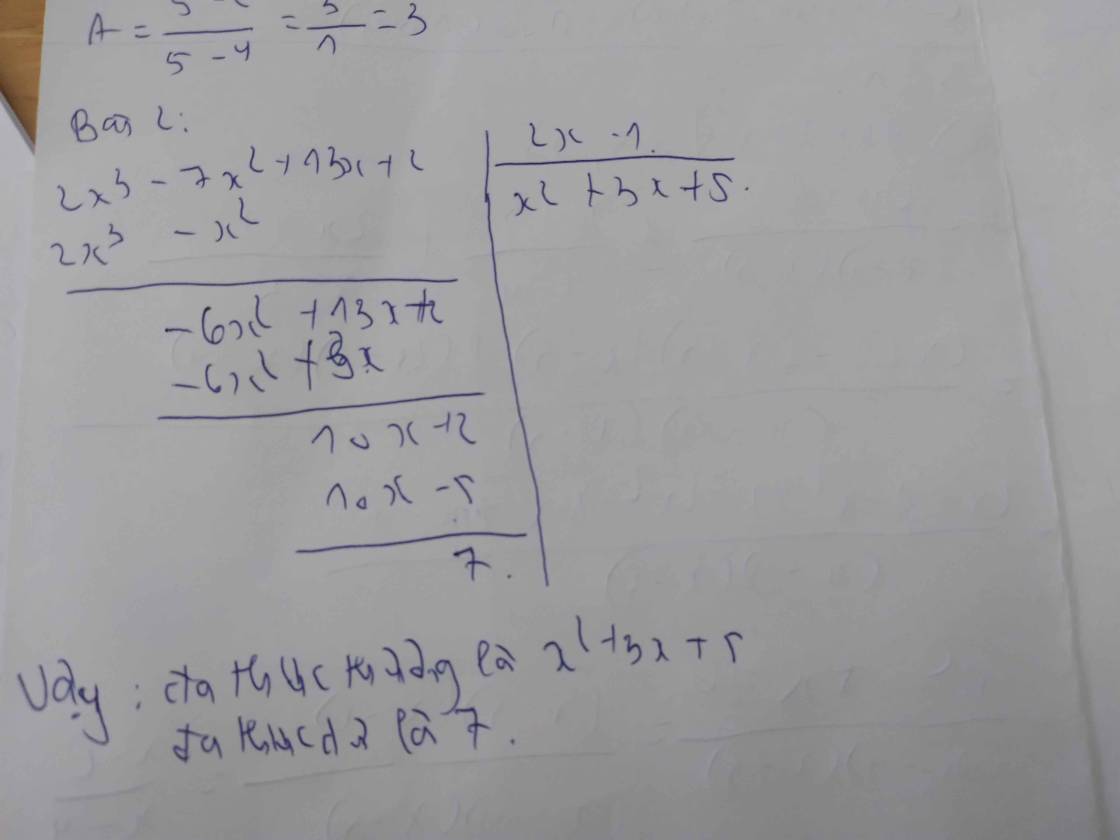Hãy nhập câu hỏi của bạn vào đây, nếu là tài khoản VIP, bạn sẽ được ưu tiên trả lời.

Bài 1:
a. $2x^3+3x^2-2x=2x(x^2+3x-2)=2x[(x^2-2x)+(x-2)]$
$=2x[x(x-2)+(x-2)]=2x(x-2)(x+1)$
b.
$(x+1)(x+2)(x+3)(x+4)-24$
$=[(x+1)(x+4)][(x+2)(x+3)]-24$
$=(x^2+5x+4)(x^2+5x+6)-24$
$=a(a+2)-24$ (đặt $x^2+5x+4=a$)
$=a^2+2a-24=(a^2-4a)+(6a-24)$
$=a(a-4)+6(a-4)=(a-4)(a+6)=(x^2+5x)(x^2+5x+10)$
$=x(x+5)(x^2+5x+10)$
Bài 2:
a. ĐKXĐ: $x\neq 3; 4$
\(A=\frac{2x+1-(x+3)(x-3)+(2x-1)(x-4)}{(x-3)(x-4)}\\ =\frac{2x+1-(x^2-9)+(2x^2-9x+4)}{(x-3)(x-4)}\\ =\frac{x^2-7x+14}{(x-3)(x-4)}\)
b. $x^2+20=9x$
$\Leftrightarrow x^2-9x+20=0$
$\Leftrightarrow (x-4)(x-5)=0$
$\Rightarrow x=5$ (do $x\neq 4$)
Khi đó: $A=\frac{5^2-7.5+14}{(5-4)(5-3)}=2$

a) đk: x khác 1; \(\dfrac{3}{2}\)
\(P=\left[\dfrac{2x}{\left(2x-3\right)\left(x-1\right)}-\dfrac{5}{2x-3}\right]:\left(\dfrac{3-3x+2}{1-x}\right)\)
= \(\dfrac{2x-5\left(x-1\right)}{\left(2x-3\right)\left(x-1\right)}:\dfrac{5-3x}{1-x}\)
= \(\dfrac{-3x+5}{\left(2x-3\right)\left(x-1\right)}.\dfrac{1-x}{-3x+5}=\dfrac{-1}{2x-3}\)
b) Có \(\left|3x-2\right|+1=5\)
<=> \(\left|3x-2\right|=4\)
<=> \(\left[{}\begin{matrix}3x-2=4< =>x=2\left(Tm\right)\\3x-2=-4< =>x=\dfrac{-2}{3}\left(Tm\right)\end{matrix}\right.\)
TH1: Thay x = 2 vào P, ta có:
P = \(\dfrac{-1}{2.2-3}=-1\)
TH2: Thay x = \(\dfrac{-2}{3}\)vào P, ta có:
P = \(\dfrac{-1}{2.\dfrac{-2}{3}-3}=\dfrac{3}{13}\)
c) Để P > 0
<=> \(\dfrac{-1}{2x-3}>0\)
<=> 2x - 3 <0
<=> x < \(\dfrac{3}{2}\) ( x khác 1)
d) P = \(\dfrac{1}{6-x^2}\)
<=> \(\dfrac{-1}{2x-3}=\dfrac{1}{6-x^2}\)
<=> \(\dfrac{-1}{2x-3}=\dfrac{-1}{x^2-6}\)
<=> 2x - 3 = x2 - 6
<=> x2 - 2x - 3 = 0
<=> (x-3)(x+1) = 0
<=> \(\left[{}\begin{matrix}x=-1\left(Tm\right)\\x=3\left(Tm\right)\end{matrix}\right.\)

Cậu xem lại đề hộ tớ xem là nhân \(\dfrac{2x}{5x-5}\)hay là chia cho \(\dfrac{2x}{5x-5}\)nhé :>

Lời giải:
ĐK: $x\neq \pm 1$
a)
\(A=\frac{(x+1)^2-(x-1)^2}{(x-1)(x+1)}.\frac{2x}{5(x-1)}=\frac{4x}{(x-1)(x+1)}.\frac{2x}{5(x-1)}=\frac{8x^2}{5(x-1)^2(x+1)}\)
b) Tại $x=4$ thì: $A=\frac{8.4^2}{5(4-1)^2(4+1)}=\frac{128}{225}$
c)
$A=5$
$\Leftrightarrow \frac{8x^2}{5(x-1)^2(x+1)}=5$
$\Leftrightarrow 8x^2=25(x-1)^2(x+1)$
PT này không phải không giải được nhưng giải phức tạp và nghiệm cực xấu. Nên mình nghĩ bạn đã viết sai đề?

a, \(P=\left(\dfrac{2x}{2x^2-5x+3}-\dfrac{5}{2x-3}\right):\left(3-\dfrac{2}{1-x}\right)\)ĐK : \(x\ne1;\dfrac{3}{2};\dfrac{1}{3}\)
\(=\left(\dfrac{2x-5\left(x-1\right)}{\left(2x-3\right)\left(x-1\right)}\right):\left(3+\dfrac{2}{x-1}\right)\)
\(=\left(\dfrac{-3x+5}{\left(2x-3\right)\left(x-1\right)}\right):\left(\dfrac{3x-3+2}{x-1}\right)\)
\(=\dfrac{\left(5-3x\right)\left(x-1\right)}{\left(2x-3\right)\left(x-1\right)\left(3x-1\right)}=\dfrac{5-3x}{\left(2x-3\right)\left(3x-1\right)}\)
b, \(\left|3x-2\right|+1=5\Leftrightarrow\left|3x-2\right|=4\)
TH1 : \(3x-2=4\Leftrightarrow x=2\)
TH2 : \(3x-2=-4\Leftrightarrow x=-\dfrac{2}{3}\)
Với \(x=2\Rightarrow P=\dfrac{5-6}{5}=-\dfrac{1}{5}\)
Với \(x=-\dfrac{2}{3}\Rightarrow P=\dfrac{5+2}{\left(-\dfrac{4}{3}-3\right)\left(-3\right)}=\dfrac{7}{-\dfrac{13}{3}.\left(-3\right)}=\dfrac{7}{13}\)
a) Ta có: \(P=\left(\dfrac{2x}{2x^2-5x+3}-\dfrac{5}{2x-3}\right):\left(3-\dfrac{2}{1-x}\right)\)
\(=\dfrac{2x-5\left(x-1\right)}{\left(2x-3\right)\left(x-1\right)}:\dfrac{3\left(1-x\right)-2}{1-x}\)
\(=\dfrac{2x-5x+5}{\left(2x-3\right)\left(x-1\right)}:\dfrac{3-3x-2}{1-x}\)
\(=\dfrac{-3x+5}{\left(2x-3\right)\left(x-1\right)}\cdot\dfrac{1-x}{-3x+1}\)
\(=\dfrac{-3x+5}{\left(2x-3\right)\left(x-1\right)}\cdot\dfrac{x-1}{3x-1}\)
\(=\dfrac{-3x+5}{2x-3}\)

a, ĐK : \(x\ne0;1\)
\(A=\dfrac{x\left(x+1\right)}{\left(x-1\right)^2}:\left(\dfrac{x^2-1+x+2-x^2}{x\left(x-1\right)}\right)=\dfrac{x\left(x+1\right)}{\left(x-1\right)^2}:\left(\dfrac{x+1}{x\left(x-1\right)}\right)\)
\(=\dfrac{x^2\left(x+1\right)\left(x-1\right)}{\left(x-1\right)^2\left(x+1\right)}=\dfrac{x^2}{x-1}\)
b, Thay x = 3 vào A ta được : \(\dfrac{9}{2}\)
c, \(A=4\Rightarrow\dfrac{x^2}{x-1}=4\Rightarrow x^2=4x-4\Leftrightarrow\left(x-2\right)^2=0\Leftrightarrow x=2\)
d, \(A< 2\Rightarrow\dfrac{x^2}{x-1}-2< 0\Leftrightarrow\dfrac{x^2-2x+1}{x-1}< 0\Rightarrow x-1< 0\Leftrightarrow x>1\)
a,\(\dfrac{x^2+x}{x^2-2x+1}:\left(\dfrac{x+1}{x}-\dfrac{1}{1-x}+\dfrac{2-x^2}{x^2-x}\right)\)
\(=\dfrac{x\left(x+1\right)}{\left(x-1\right)^2}:\left(\dfrac{\left(x+1\right)\left(x-1\right)}{x\left(x-1\right)}+\dfrac{x}{x\left(x-1\right)}+\dfrac{2-x^2}{x\left(x-1\right)}\right)\)
\(=\dfrac{x\left(x+1\right)}{\left(x-1\right)^2}:\left(\dfrac{x^2-1+x+2-x^2}{x\left(x-1\right)}\right)\)
\(=\dfrac{x\left(x+1\right)}{\left(x-1\right)^2}:\dfrac{x+1}{x\left(x-1\right)}\)
\(=\dfrac{x\left(x+1\right)}{\left(x-1\right)^2}.\dfrac{x\left(x-1\right)}{x+1}\)
\(=\dfrac{x^2}{x-1}\)

ĐKXĐ: \(x\notin\left\{2;-2;-1\right\}\)
a) Ta có: \(A=\left(\dfrac{x}{x^2-4}-\dfrac{4}{2-x}+\dfrac{1}{x+2}\right):\dfrac{3x+3}{x^2+2x}\)
\(=\left(\dfrac{x}{\left(x-2\right)\left(x+2\right)}+\dfrac{4\left(x+2\right)}{\left(x-2\right)\left(x+2\right)}+\dfrac{1}{x+2}\right):\dfrac{3\left(x+1\right)}{x\left(x+2\right)}\)
\(=\left(\dfrac{x+4x+8}{\left(x-2\right)\left(x+2\right)}+\dfrac{x-2}{\left(x+2\right)\left(x-2\right)}\right)\cdot\dfrac{x\left(x+2\right)}{3\left(x+1\right)}\)
\(=\dfrac{5x+8+x-2}{\left(x+2\right)\left(x-2\right)}\cdot\dfrac{x\left(x+2\right)}{3\left(x+1\right)}\)
\(=\dfrac{6x+6}{\left(x+2\right)\left(x-2\right)}\cdot\dfrac{x\left(x+2\right)}{3\left(x+1\right)}\)
\(=\dfrac{6\left(x+1\right)}{x-2}\cdot\dfrac{x}{3\left(x+1\right)}\)
\(=\dfrac{2x}{x-2}\)
b) Để A nguyên thì \(2x⋮x-2\)
\(\Leftrightarrow2x-4+4⋮x-2\)
mà \(2x-4⋮x-2\)
nên \(4⋮x-2\)
\(\Leftrightarrow x-2\inƯ\left(4\right)\)
\(\Leftrightarrow x-2\in\left\{1;-1;2;-2;4;-4\right\}\)
\(\Leftrightarrow x\in\left\{3;1;4;0;6;-2\right\}\)
Kết hợp ĐKXĐ, ta được:
\(x\in\left\{0;1;3;4;6\right\}\)
Vậy: Khi \(x\in\left\{0;1;3;4;6\right\}\) thì A nguyên



a) Ta có: \(A=\left(\dfrac{2x}{2x^2-5x+3}-\dfrac{5}{2x-3}\right):\left(3+\dfrac{2}{1-x}\right)\)
\(=\dfrac{2x-5\left(x-1\right)}{\left(2x-3\right)\left(x-1\right)}:\dfrac{3\left(x-1\right)-2}{x-1}\)
\(=\dfrac{2x-5x+5}{2x-3}\cdot\dfrac{1}{3x-3-2}\)
\(=\dfrac{-3x+5}{2x-3}\cdot\dfrac{1}{3x-5}\)
\(=\dfrac{-1}{2x-3}\)
c) Để A>0 thì 2x-3<0
hay \(x< \dfrac{3}{2}\)
Kết hợp ĐKXĐ, ta được: \(\left\{{}\begin{matrix}x< \dfrac{3}{2}\\x\ne1\end{matrix}\right.\)
Tham khảo:Cho biểu thức P= \((\frac{2x}{2x^2-5x+3}-\frac{5}{2x-3}):(3+\frac{2}{1-x})\) a) Rút gọn P b) Tính P với |3x-2|+1=5 c)... - Hoc24
a) ĐKXĐ: x∉{1;32}x∉{1;32}
Ta có: A=(2x2x2−5x+3−52x−3):(3+21−x)P=(2x2x2−5x+3−52x−3):(3+21−x)
=(2x(x−1)(2x−3)−5(x−1)(2x−3)(x−1)):(3(x−1)(2x−3)(x−1)(2x−